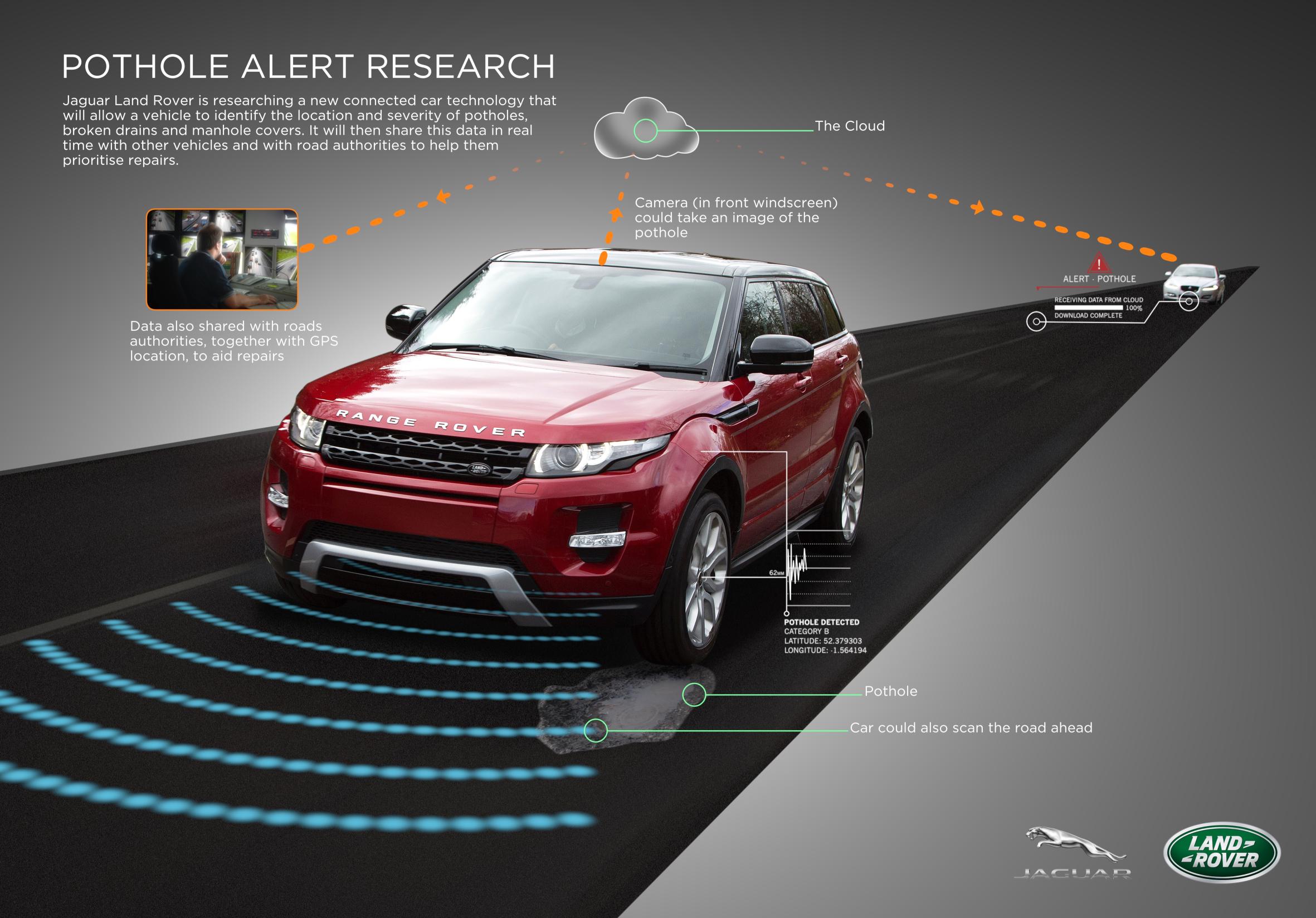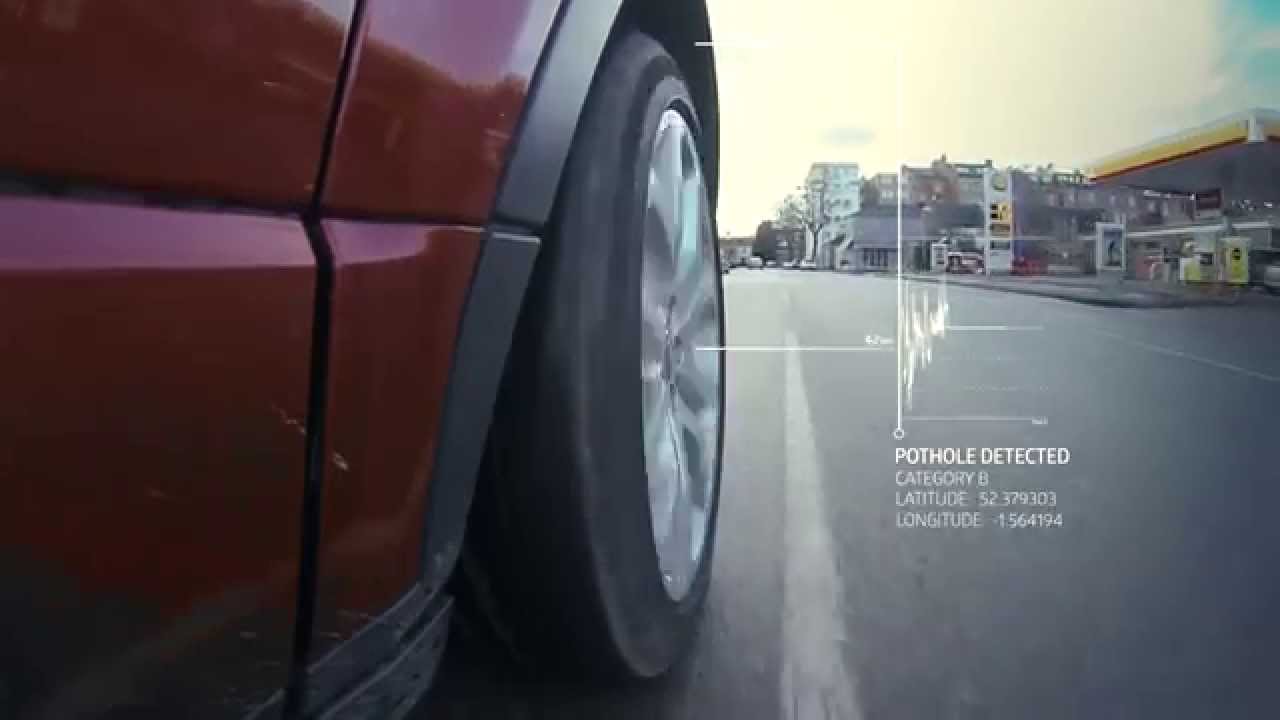
- Jaguar Land Rover’s pioneering ‘Pothole Alert’ research could help save motorists billions of pounds in punctures, vehicle damage and road accidents every year
- Range Rover Evoque research vehicle can identify the location and severity of potholes and broken manhole covers – and adjust suspension in milliseconds
- Jaguar Land Rover researchers developing technology to share this data with other cars via the cloud so all drivers get a warning about dangerous potholes
- Research with Coventry City Council to understand how sharing data with road authorities could enhance the speed and efficiency of road repairs
Whitley, UK: Jaguar Land Rover is researching a new connected car technology that will allow a vehicle to identify the location and severity of potholes, broken drains and manhole covers, and then share this data in real-time via the cloud with other vehicles and with road authorities to help them prioritise repairs.
If a car can receive a warning from another vehicle about severe potholes or broken manholes ahead, then drivers would be able to slow down and avoid the danger – or the car could adjust suspension settings to reduce the impact and smooth the ride. This could help reduce the potential for punctures, wheel and vehicle damage as well as road accidents.
Dr Mike Bell, Global Connected Car Director, Jaguar Land Rover, said: “Our MagneRide equipped Range Rover Evoque and Discovery Sport vehicles feature sophisticated sensors that allow the vehicle to profile the road surface under the wheels and identify potholes, raised manholes and broken drain covers. By monitoring the motion of the vehicle and changes in the height of the suspension, the car is able to continuously adjust the vehicle’s suspension characteristics, giving passengers a more comfortable ride over uneven and damaged road surfaces.
“While this gives our customers a more comfortable ride, we think there is a huge opportunity to turn the information from these vehicle sensors into ‘big data’ and share it for the benefit of other road users. This could help prevent billions of pounds of vehicle damage and make road repairs more effective.”
PREDICTING POTHOLES ON THE ROAD TO AUTONOMOUS DRIVING
The next stage of the project at Jaguar Land Rover’s Advanced Research Centre in the UK is to install new road surface sensing technology in the Range Rover Evoque research vehicle, including an advanced forward-facing stereo digital camera.
“At the moment the most accurate data comes from when the car has driven over the pothole or manhole”, added Mike Bell. “So we are also researching how we could improve the measurement and accuracy of pothole detection by scanning the road ahead, so the car could predict how severe they are before the vehicle gets near them.
“Ultimately, sensing the road ahead and assessing hazards is a key building block on our journey to the autonomous car. In the future, we are looking to develop systems that could automatically guide a car around potholes without the car leaving its lane and causing a danger to other drivers. If the pothole hazard was significant enough, safety systems could slow or even stop the car to minimize the impact. This could all help make future autonomous driving a safe and enjoyable reality.”
POTHOLE ALERT AND ROAD REPAIRS
Jaguar Land Rover’s research team will also be working with innovation partner Coventry City Council to understand how road profile information could be shared with road authorities, and exactly what data would be most useful for their roads maintenance teams to identify and prioritise repairs.
Councillor Rachel Lancaster, Cabinet Member for Public Services at Coventry City Council said: “As part of our ‘Smart Cities’ strategy, we will be investigating how Jaguar Land Rover’s Pothole Alert system could supply us with data in real-time from thousands of connected cars right across our road network. This could give us a very accurate, minute-by-minute picture of damage to road surfaces, manholes and drains in real time.
“We already collect lots of data which we monitor very carefully ourselves but having this kind of extra information might allow us to further improve our maintenance programmes which would save the taxpayer money.”
The project will also investigate whether Jaguar Land Rover’s experimental camera could take an image of the pothole or damaged manhole – and share this with the road authorities, together with a GPS location.
“We are just beginning to explore how we could use this technology, but data that includes the severity of the issue, its exact location and an image has huge potential,” added Councillor Lancaster. “This is just the sort of information that could help us identify the cause of the problem, prioritise it and contact the owner of the manhole or drain to get it fixed more quickly.”

